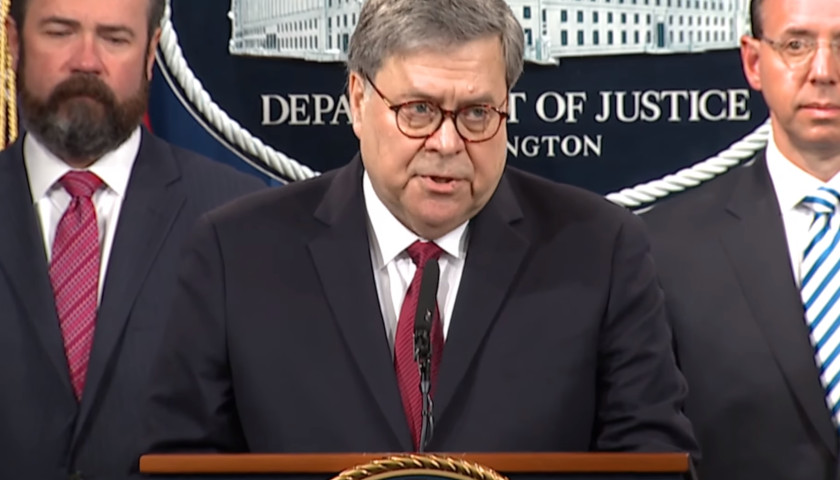by Luke Rosiak
Special counsel Robert Mueller’s two-year investigation did not find potential “obstruction of justice” by President Donald Trump beyond incidents that were already largely known.
“As the special counsel’s report acknowledges, there is substantial evidence to show that the president was frustrated and angered by a sincere belief that the investigation was undermining his presidency, propelled by his political opponents, and fueled by illegal leaks,” Attorney General William Barr said Thursday morning. “Federal agents and prosecutors were scrutinizing his conduct. … There was relentless speculation in the news media about the president’s personal culpability. Yet, as he said from the beginning, there was in fact no collusion.”
 “Apart from whether the acts were obstructive, this evidence of non-corrupt motives weighs heavily against any allegation that the president had a corrupt intent to obstruct the investigation,” he added.
“Apart from whether the acts were obstructive, this evidence of non-corrupt motives weighs heavily against any allegation that the president had a corrupt intent to obstruct the investigation,” he added.
Mueller described acts of potential obstruction of justice without reaching any legal conclusions. Barr “concluded that the evidence developed during the special counsel’s investigation is not sufficient to establish that the president committed an obstruction-of-justice offense,” he said at a press conference.
They included, according to the special counsel’s roughly 400-page report:
- Trump “publicly expressed skepticism that Russia was responsible for the hacks at the same time that he and other Campaign officials privately sought information [redacted] about any further planned Wikileaks releases. Trump also denied having any business in or connection to Russia, even though as late as June 2016 the Trump organization had been pursuing a licensing deal for a skyscraper to be built in Russia.”
- Trump told former FBI Director Jim Comey: “I hope you can see your way clear to letting this go, to letting [Michael] Flynn go,” after Flynn lied about speaking with a Russian ambassador and Trump fired him.
- In early March 2017, Trump told White House counsel Donald McGahn to “stop [former Attorney General Jeff] Sessions from recusing. And after Sessions announced his recusal on March 2, the President expressed anger at the decision.” Trump later called Sessions at home and asked him to un-recuse. Trump said, “I’m not going to do anything or direct you to do anything. I just want to be treated fairly.”
- Trump fired Comey, saying that when he “decided to just do it,” he was thinking that “this thing with Trump and Russia is a made-up story.”
- In May 2017, Trump said that a special counsel investigation hanging over his head would be the “end of his presidency” and demanded that Sessions resign. Sessions submitted his resignation but Trump did not accept it. Trump told advisers he thought Mueller had conflicts of interest. By June 2017, the press said the special counsel was investigation whether Trump obstructed justice, and Trump tweeted angrily about it.
- On June 17, Trump “called McGahn at home and directed him to call the Acting Attorney General and say that the Special Counsel had conflicts of interest and must be removed. McGaghn did not carry out the direction, however, deciding that he would resign rather than trigger what he regarded as a potential Saturday Night Massacre.” When this leaked to the media, Trump pressured McGahn to deny it.
- On June 19, Trump asked former campaign manager Corey Lewandowski to tell Sessions that he should tell Mueller to limit his probe to election meddling in future elections. Lewandowski punted the task to Rick Dearborn, who did not follow through.
- Trump also wrote a press statement for his son about a meeting with a Russian lawyer in Trump Tower and directed aides not to publicly disclose the emails setting up the meeting.
- When Flynn began cooperating with prosecutors, Trump’s attorneys asked for a “heads up” if Flynn knew “information that implicates the president.” When Flynn’s lawyer declined, Trump’s lawyer said he’d make sure the president knew Flynn’s actions reflected “hostility.” Trump also commended Paul Manafort for not “flipping.” Meanwhile, he encouraged Michael Cohen to “stay strong” instead of “flip,” and after he did, called him a “rat.”
Mueller says when it comes to firing Comey, the “evidence does not establish that the termination of Comey was designed to cover up a conspiracy between the Trump Campaign and Russia. … The initial reliance on a pretextual justification could support an inference that the President had concerns about providing the real reason for the firing, although the evidence does not resolve whether those concerns were personal, political, or both.”
When it came to efforts that “involved his communications team and w[ere] directed at the press,” they would amount to obstruction “only if the President, by taking these actions, sought to withhold information from or mislead congressional investigators or the Special Counsel,” since the media are not government investigators.
Mueller noted that he could not definitively rule out that Trump had obstructed justice, saying the case presented “difficult issues.” He wrote: “At the same time, if we had confidence after a thorough investigation of the facts that the President clearly did not commit obstruction of justice, we would so state.”
Barr said Trump’s actions stemmed simply from frustration at being wrongly accused and that intent was key. “The president took no act that in fact deprived the special counsel of the documents and witnesses necessary to complete his investigation,” he said. “Apart from whether the acts were obstructive, this evidence of non-corrupt motives weighs heavily against any allegation that the president had a corrupt intent to obstruct the investigation.”
– – –
Luke is the author of the new book “Obstruction of Justice: How the Deep State Risked National Security to Protect the Democrats.” Email Luke at [email protected]. Follow him on Twitter.
Photo “William Barr Press Conference” by PBS Newshour.





